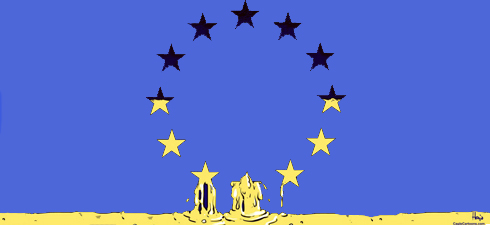This summer, which heard the bell ringing on the final round of the euro crisis, German politicians have been seizing the pleasure of arguing over the future of Europe. The Social Democrats and the Greens plead for a European debt union, including banking and fiscal union – briefly put, they’re all for handing sovereignty over Germany’s budget to Brussels. The CDU, meanwhile, happily allude to the principles behind their desire to shape Europe into a political union – whatever that may mean in the finer details. Since all that would deeply encroach upon Germany’s Basic Law, talk of a referendum, and a speedy one if possible, is also in the air.
Slow down!, one is tempted to cry out. True, the European Union is poorly prepared for the storms of the globalised world. In the great financial crisis, the political structure of the Union has been measured and judged to be unstable. Before the heart of national sovereignty is sacrificed in the rush ahead, however, it would be advisable to find out if there is even an altar worth making a sacrifice on.
The illusion of quick and easy solutions
Beyond Germany, there are no European states or peoples willing by a large majority to make the leap from the confederation of sovereign countries to a European federal state. Whether, in the end, even the Germans themselves want to betray this sovereignty may also be doubted. This crisis has not brought the European nations closer. Instead, it has made them more sceptical about the European project.
Seven years ago a European constitutional treaty perished miserably in a round of referenda, although it hardly touched on national sovereignty. A covenant that downgrades the European nations to federal states will assuredly suffer a harsher fate.
The reality in Europe will not be thrust aside by desires. And here a further realisation is pertinent: even if it were possible to persuade some nations to transfer the heart of their sovereignty to the European Union’s head office, the new Europe would be smaller, much smaller, than the present one. Led by the UK, some would step down off the European Union train. What would be left would be a shrunken European core that would probably be too small to develop into a major political force globally.
It’s understandable that it’s precisely in Germany where the desire is growing for a radical overhaul of the European Union. That desire, though, is unwise. The current crisis is broader and deeper than the crisis that came before it, and that’s exactly why one must be wary of the illusion that there are quick and easy solutions.
Preventing panic is the immediate priority
A debt union may calm the markets over the short term, but it won’t bring permanent stability to the EU. The turbulence buffeting the single currency is not the cause, after all, but merely a symptom of the true malaise of the European Union: it is not trusted. It has persuaded neither the world nor its own citizens that it can fill the boots of a strong and reliable power. There is too much confusion and working at cross purposes in the EU for that – in economics and finance, and in foreign and security policy. Europe has not yet persuaded the rest of the world that it has in reality grown together and irreversibly so.
A reform carried out in haste will be just another patch-up job that would only increase the mistrust, especially when it is Germany that calls for the reform. And so the tempo of the debate must be slowed down: those states in particular that are sceptical of reform must start off by saying what Europe wants to be in the future and just how it should get there. This central question of the identity of the European Union cannot be answered amidst the panic of the crisis – that would lead unerringly to disaster.
Those who want to help Europe should stop fantasising about grand solutions. The crisis and the basic make-up of the EU can only be resolved one after the other. First, the euro crisis must be settled, if necessary by the expulsion of Greece and a massive market intervention by the European Central Bank. Only when the panic is over can the Member States and the peoples find the breathing room to agree on the final form of the European Union.
Was this article useful? If so we are delighted!
It is freely available because we believe that the right to free and independent information is essential for democracy. But this right is not guaranteed forever, and independence comes at a cost. We need your support in order to continue publishing independent, multilingual news for all Europeans.
Discover our subscription offers and their exclusive benefits and become a member of our community now!












